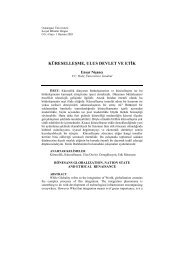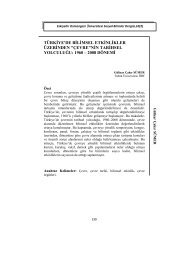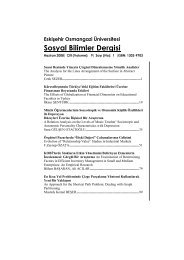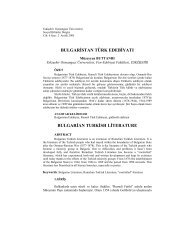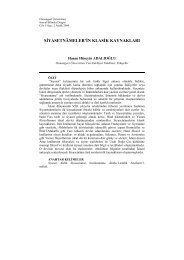image of muslim turks on the restoration stage - Eskişehir ...
image of muslim turks on the restoration stage - Eskişehir ...
image of muslim turks on the restoration stage - Eskişehir ...
You also want an ePaper? Increase the reach of your titles
YUMPU automatically turns print PDFs into web optimized ePapers that Google loves.
B. Ayça ÜLKER ERKAN<br />
<strong>Eskişehir</strong> Osmangazi Üniversitesi Sosyal Bilimler Dergisi, 11(2)<br />
great Turks . . .” (Orr 63). In fact, <strong>the</strong> fear <str<strong>on</strong>g>of</str<strong>on</strong>g> expansi<strong>on</strong>ist Ottomans<br />
appeared in Mrs. Sullen’s speech while she was describing <strong>the</strong> place as<br />
“<strong>the</strong> cruel <str<strong>on</strong>g>of</str<strong>on</strong>g> <strong>the</strong> governor forces <strong>the</strong> garris<strong>on</strong>”. The Ottoman Empire was<br />
called as “cruel” government that also embodied <strong>the</strong> comm<strong>on</strong> fears <str<strong>on</strong>g>of</str<strong>on</strong>g> <strong>the</strong><br />
British Empire.<br />
In <strong>the</strong> very beginning <str<strong>on</strong>g>of</str<strong>on</strong>g> Act IV, Mrs. Sullen comments <strong>on</strong> Muslim Turks<br />
and <strong>the</strong> situati<strong>on</strong> <str<strong>on</strong>g>of</str<strong>on</strong>g> Turkish women as pris<strong>on</strong>ers <str<strong>on</strong>g>of</str<strong>on</strong>g> <strong>the</strong> harem:<br />
MRS.SUL. Were I born a humble Turk, where women<br />
have no soul nor property, <strong>the</strong>re I must sit<br />
c<strong>on</strong>tended. But in England, a country whose<br />
women are its glory, must women be abused?<br />
Where women rule, must women be enslaved?<br />
Nay, cheated into slavery, mocked by a promise<br />
<str<strong>on</strong>g>of</str<strong>on</strong>g> comfortable society into a wilderness <str<strong>on</strong>g>of</str<strong>on</strong>g><br />
solitude? I dare not keep <strong>the</strong> thought about me. –<br />
Oh, here comes something to divert me. (Act IV,<br />
i)<br />
Mrs. Sullen here points out <strong>the</strong> c<strong>on</strong>diti<strong>on</strong>s <str<strong>on</strong>g>of</str<strong>on</strong>g> Ottoman women <str<strong>on</strong>g>of</str<strong>on</strong>g> harem<br />
and polygamy that were inevitably <strong>the</strong> most discussed topics in Western<br />
culture <str<strong>on</strong>g>of</str<strong>on</strong>g> that era. Thus, <strong>the</strong> stereotype <str<strong>on</strong>g>of</str<strong>on</strong>g> <strong>the</strong> Oriental woman appeared<br />
as “docile, ignorant, inactive and uneducated” (Lewis, Rethinking 102).<br />
Both <strong>the</strong> seclusi<strong>on</strong> and <strong>the</strong> polygamous life were associated with Islam<br />
especially through <strong>the</strong> last decades <str<strong>on</strong>g>of</str<strong>on</strong>g> <strong>the</strong> Ottoman Empire. It is important<br />
to note that this segregati<strong>on</strong> and by implicati<strong>on</strong> <str<strong>on</strong>g>of</str<strong>on</strong>g> <strong>the</strong> polygamous life<br />
was central to <strong>the</strong> dominant Western Orientalist fantasy. It is most<br />
possible that “<strong>the</strong> West expects to hear unwholesome stories when it<br />
reads <str<strong>on</strong>g>of</str<strong>on</strong>g> <strong>the</strong> Eastern homes . . .” (Ellis<strong>on</strong> qtd. in Lewis, Rethinking 100).<br />
The exoticism <str<strong>on</strong>g>of</str<strong>on</strong>g> Turkey and <strong>the</strong> difference between <strong>the</strong> East and <strong>the</strong><br />
West haunts <strong>the</strong> imaginati<strong>on</strong> <str<strong>on</strong>g>of</str<strong>on</strong>g> <strong>the</strong> Western culture. As emphasized in<br />
<strong>the</strong> quotati<strong>on</strong> from <strong>the</strong> play, <strong>the</strong> West localized <strong>the</strong> oppressi<strong>on</strong> in <strong>the</strong> East<br />
and <strong>the</strong> positi<strong>on</strong> <str<strong>on</strong>g>of</str<strong>on</strong>g> women as pris<strong>on</strong>ers <str<strong>on</strong>g>of</str<strong>on</strong>g> <strong>the</strong> harem. This tendency aims<br />
at misapprehensi<strong>on</strong>s about <strong>the</strong> harem and <strong>the</strong> life in <strong>the</strong> harem. The harem<br />
was also a place where <strong>the</strong> s<strong>on</strong>s <str<strong>on</strong>g>of</str<strong>on</strong>g> Ottoman Emperor were raised by <strong>the</strong>ir<br />
mo<strong>the</strong>rs. However, <strong>on</strong>ly <strong>on</strong>e s<strong>on</strong> <str<strong>on</strong>g>of</str<strong>on</strong>g> <strong>the</strong> Emperor would become <strong>the</strong><br />
Emperor in <strong>the</strong> future and would take <strong>the</strong> place <str<strong>on</strong>g>of</str<strong>on</strong>g> his fa<strong>the</strong>r. The rest <str<strong>on</strong>g>of</str<strong>on</strong>g><br />
<strong>the</strong> s<strong>on</strong>s would be killed by <strong>the</strong> recent Emperor to avoid <str<strong>on</strong>g>of</str<strong>on</strong>g> <strong>the</strong> possibility<br />
<str<strong>on</strong>g>of</str<strong>on</strong>g> <strong>the</strong> upheaval. For this reas<strong>on</strong>, <strong>the</strong>re was rivalry going <strong>on</strong> am<strong>on</strong>g <strong>the</strong><br />
mo<strong>the</strong>rs <str<strong>on</strong>g>of</str<strong>on</strong>g> <strong>the</strong> future sultans within <strong>the</strong> limits <str<strong>on</strong>g>of</str<strong>on</strong>g> <strong>the</strong> harem. Although<br />
polygamy and segregati<strong>on</strong> put <strong>the</strong> Ottoman women in quest for selfdefiniti<strong>on</strong><br />
and aut<strong>on</strong>omy, <strong>the</strong> status <str<strong>on</strong>g>of</str<strong>on</strong>g> women in general improved much<br />
since <strong>the</strong> Tanzimat Reforms (1839-76).<br />
38



